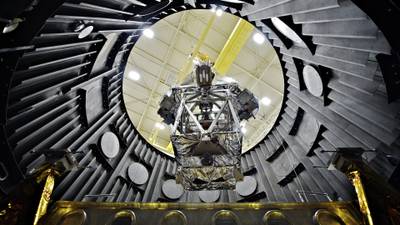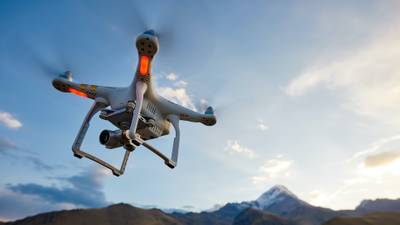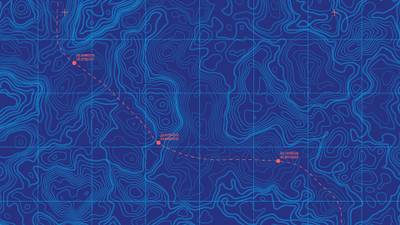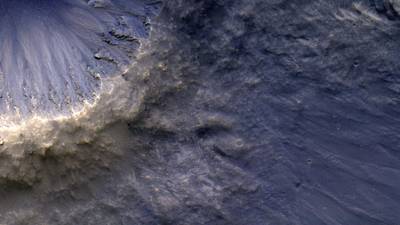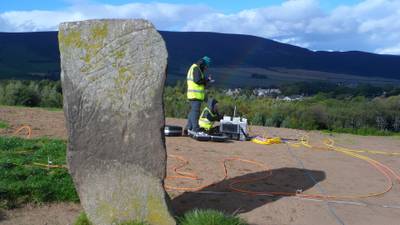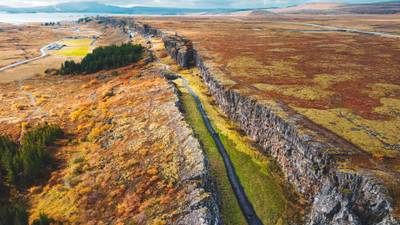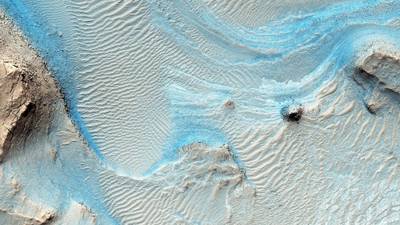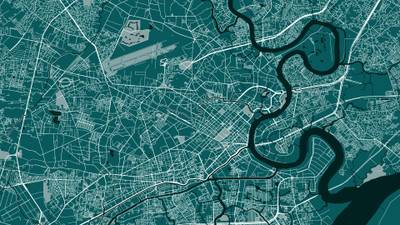Join us online to learn how remote sensing is used in space exploration.
In this flexible online short course, you’ll develop your understanding of planetary remote sensing principles and methods.
We’ll introduce you to:
- remote sensing, which is the acquisition of information from a distance, typically via airborne and spaceborne sensors
- the integration and analysis of remotely sensed data in a geospatial environment, and
- the basics of geospatial analysis and its applications.
Who can join this online planetary remote sensing course?
Space exploration offers opportunities for everyone, regardless of your field of study.
This Masters-level short course is open to students from any discipline.

Build credits towards a Masters degree
This short course is part of online:
You can use the credits you earn on this course towards this MSc qualification.
What you’ll study
In this course, you’ll train in:
- performing geospatial integration and analysis of different spatial datasets
- different approaches to automating the processing of geospatial datasets using ArcGIS Pro software, and
- writing Python scripts by configuring Spyder IDE for using the ArcPy library.
ArcPy is a Python site package for performing geographic information system (GIS) functions available in ArcGIS.
You’ll cover topics including:
- main principles behind remote sensing
- remote sensing in different parts of the electromagnetic spectrum
- basic remote sensing techniques
- real aperture radar
- synthetic aperture radar
- communications systems for signal transmission
- digital image processing
- basics of geospatial analysis
- watershed analysis using DEM (digital elevation model)
- automation in GIS using ArcPy in ArcGIS Pro.
By the end of this course, you’ll be able to...
-
Perform geospatial integration and analysis using ArcGIS Pro.
-
Download and manage data from databases.
-
Integrate diverse scientific information for comprehensive analysis.
-
Use ArcGIS Pro for automating GIS processes.
-
Critically evaluate geological investigations and interpretations based on your own observations and deductions.
-
Understand the basics of remote sensing and geospatial analysis.
Choose the University of Aberdeen for flexible online planetary sciences courses

Fits around full-time work
This online course fits around work, with flexible hours and 24/7 study access.

Over 525 years of excellence
Study with the fifth-oldest university in the English-speaking world, founded in 1495.

You’re in expert hands
We’ve been delivering online and distance learning for decades.
How you’ll study
Online learning
This distance-learning planetary remote sensing course is delivered flexibly, 100% online.
You can learn with us anywhere in the world, no student visa required, and manage your study hours to suit you.
Your teaching
This course is taught at Masters level.
Teaching is delivered through MyAberdeen, our online Virtual Learning Environment (VLE). It holds all the materials, tools and support you’ll need in your studies. Take a look around MyAberdeen.
You can access your learning materials on computer, smartphone and laptop, 24 hours a day. You’ll find a range of resources available, including:
- videos
- pre-recorded video lectures
- online tutorials
- live online sessions
- audio clips
- slide shows
- online tools
- reading materials
- discussion boards with your tutors and peers
- the online resources of our award-winning Sir Duncan Rice Library.
Live online sessions
This course features between two and four live online sessions. These sessions will be recorded, so you can view them anytime if you’re unable to attend live.
Your tutors
This online short course is delivered by our Department of Planetary Sciences, within the School of Geosciences.
The Department of Planetary Science is focused on the study of Earth and planetary sciences, and the development of instruments for Earth and planetary exploration.
Outstanding expertise
You’ll learn from teaching staff who are highly experienced in remote sensing data analysis and field trip campaigns all around the world.
Your course coordinator is one of the major specialists in Himalayas campaigns and remote sensing data analysis of the area.
This course is assessed online.
You’ll be assessed throughout this course via:
- a project, and
- your use of remote sensing principles and image analysis.
Live online sessions
This course features live online sessions.
Each session is scheduled to last for around one hour.
Session times will be organised at the start of the course. Your coordinator will consider everyone’s circumstances and time zones before setting up times.
Live sessions will be recorded, so you can view them anytime if you are unable to attend live.
Study hours
The course totals approximately 150 hours of study and assessment time. That’s around 10 – 15 hours per week.
This is an indicative guide to the time required for a typical student at this level to achieve the learning outcomes. This includes time for independent study, as well as teaching and assessments.
You can largely set your own study hours each week to cover the materials. MyAberdeen is available 24/7, so you can log in and study when it suits you.
Activities at fixed times
There will be some activities scheduled at fixed times, such as meetings with your tutor or assessments with deadlines. But otherwise, you can access and work through each course at your convenience.
Our first-class support structure will ensure that you aren’t alone in your studies. You’ll have contact with your coordinator via email, MyAberdeen and Microsoft Teams. You can use social media and discussion boards to chat with your fellow students too.
We provide a wide range of services to support you in your studies and beyond:
- Careers and Employability Service
- Disability support
- IT support
- Library support
- Student Support Service – help with finances, wellbeing, and non-academic issues
- Student Learning Service – study skills support and advice
- Aberdeen University Students’ Association (AUSA) – run by students for students
- Toolkit – clever apps and free training that can make your study life easier
Wherever you are in the world, you’ll feel part of our very special Aberdeen learning community.
Your course coordinator

Dr Shaktiman Singh
Shaktiman is an environmental scientist who teaches across the MSc GIS programme, helping students build strong technical skills and apply geospatial tools to real-world challenges. His teaching emphasises clarity, practical problem-solving, and critical thinking, preparing graduates for diverse careers. His research focuses on climate-driven landscape change, including glacier melt, permafrost, and extreme weather, using remote sensing and spatial modelling to connect cutting-edge science with the classroom.
View Shaktiman’s profileWhere this will take you
Towards a Masters
You’ll earn 15 credits at Masters level (SCQF Level 11) with this course. You can use these credits towards our:

Masters in Planetary Sciences
Move into a career in the space industry, whatever your academic background. Join our online Masters degree and study anywhere, at your own pace.
View MSc Planetary SciencesCareers
This course is valuable learning for career progression within:
- the space sector
- the energy sector
- the military sector
- urbanism
- government consultancy
- research in academia, public, or private research institutions.
Continuing Professional Development (CPD)
Your employer or professional institute may recognise this course for CPD hours. Talk to your employer or institute to find out more.

Free career support
Access our free careers service while you study.
- 1:1 appointments
- CV checks
- Interview prep
- Job opportunities
Entry requirements
Entry requirements
We welcome students from all over the world.
This course has no formal entry requirements. You do not need to provide proof of your qualifications.
But you do need to check the entry guidance above to understand the level of teaching delivered, to decide if this course is right for you.
If you do not have qualifications from the UK, check the equivalent teaching level for your country.
Visa requirements
You do not need a student visa to study online with us.
English language requirements
Teaching is delivered in English.
You do not have to provide proof of your English language skills to join this course. But we want to make sure that you can use English well enough to study successfully.
Recommended level of English
For this course, we recommend the following level of English language proficiency.
These are our Postgraduate Standard requirements, and these are minimum scores.
IELTS Academic, IELTS UKVI Academic, or IELTS Online (not IELTS Indicator or IELTS General Training)
- 6.5 overall
- 5.5 for listening, reading and speaking
- 6.0 for writing
TOEFL iBT or TOEFL iBT Home Edition
- 90 overall
- 17 for listening
- 18 for reading
- 20 for speaking
- 21 for writing
- TOEFL DI code is 0818
Cambridge English: B2 First, C1 Advanced, or C2 Proficiency
- 176 overall
- 162 for listening, reading and speaking
- 169 for writing
LanguageCert Academic / LanguageCert Academic SELT
- 70 overall
- 60 for listening, reading and speaking
- 65 for writing
Oxford ELLT Digital – English Language Level Test Online
- 7.0 overall
- 5.0 for listening, reading and speaking
- 6.0 for writing
PTE Academic (online test not accepted)
- 62 overall
- 59 for listening, reading, speaking and writing
Skills for English: SELT
- B2 pass with merit
Duolingo – tests taken from 1 July 2024 onward
- 120 overall
- 95 for listening, reading and speaking
- 105 for writing
University of Aberdeen English Pre-sessional Programme (PSE)
- Pass
- Valid for one year. Refresher can be offered if out of date
Pre-sessional academic English preparation programmes undertaken at other UK universities
- Pass at an equivalent of 6.5 (C1)
- B2 in all four skills
- Certification must be within one year prior to the start of your course
For full information about language requirements, see our English Language Requirements page.
You will need access to:
A computer (PC, laptop or Mac) with an up-to-date operating system
Most teaching materials are smartphone- and tablet-friendly. But we recommend a proper laptop or desktop for completing assignments comfortably.
Reliable internet access
We recommend:
- a wired connection
- a minimum download speed of 2 Mbps so you can take part fully in live sessions.
Speakers or headphones
- We recommend a headset with built-in microphone and earphones if you’re likely to study in an environment with background noise.
- A webcam is optional, but you may like to use one for some interactive sessions.
Software
We’ll give you access to Office365 applications. This means you can use online versions of Microsoft Word, Excel, PowerPoint and OneDrive and install these programs on up to five personal devices.
If your course requires specialist software, we’ll provide you with access to this and a licence that lasts throughout your studies.
See our detailed IT requirements for more information.
When you study with us, you can expect a first-class support structure so that you’re never alone in your studies.
But learning online does mean you have to motivate yourself and manage your own time.
Your most important commitment will be time – the time to work through, reflect on and understand your teaching materials.
Before you start a course that involves a high degree of independent study, we recommend looking at the time you will be able to devote to your studies each week:
- Be realistic
- Create a weekly schedule as a guide
If you have any questions about studying online, get in touch with our friendly team. We’re here to help.
Fee payment
Your course fee needs to be paid in full before you start your course.
We accept payment via Visa Debit, Visa Credit and Mastercard.
Ways to save
You may be able to get help funding this course via:
- discounts – if any discounts are available for this course, they’ll appear in the section below
- employer sponsorship – we accept full and partial fee payments from sponsors.
Find out more about funding options.
Student card
All our students are entitled to a University of Aberdeen student card. This gives you access to a range of student discounts around the city and online.
Learning resources
Access to all the books and resources you need are included in your tuition fee. They’ll be made available to you online and you do not have to buy your own copies.
Printing
You may wish to set aside a small budget for printing, depending on how you like to work.
This course has no formal entry requirements. You decide if it’s suitable for you.
The course is delivered at Masters level. At this level, you’d usually have at least:
- a 2:2 UK honours degree (or equivalent) in any discipline, or
- relevant professional experience that supports this level of learning.

